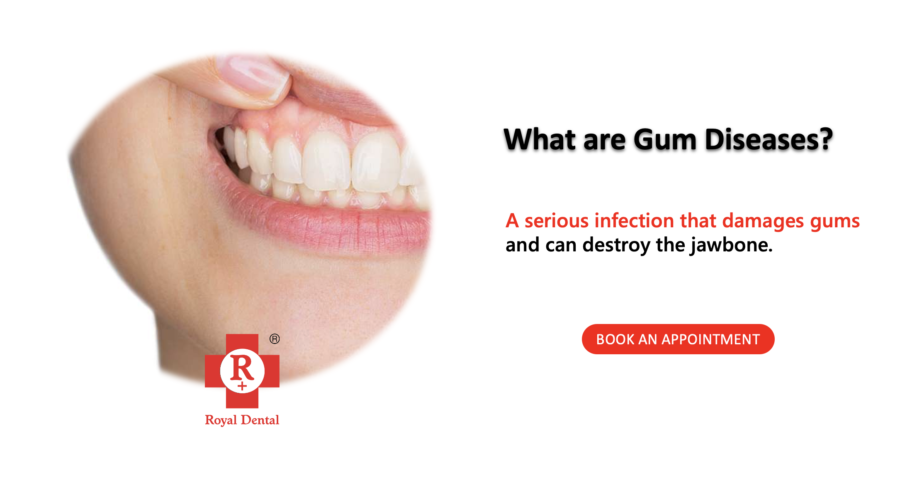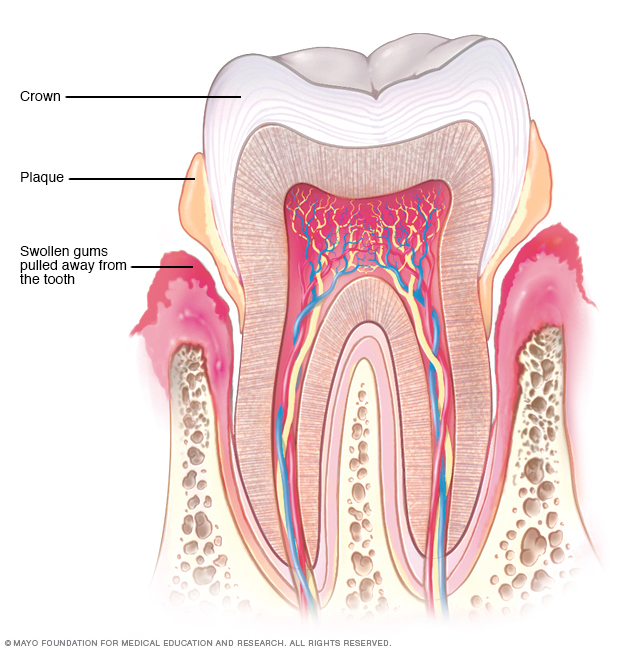Periodontal disease is a bacterial infection that can weaken your gums and cause them to recede. In severe cases, the bacteria can spread to other tissues in the mouth, leading to more advanced stages of periodontal disease. Some people with this condition may be advised to get dental crowns on their teeth as a preventive measure. However, this procedure is not recommended for everyone with periodontal disease. There are different types of crowns that you can get when you have periodontal disease. Let’s read more.
What is a dental crown?
A crown is a dental restoration designed to cover the entire visible part of a tooth. It is used to treat various dental conditions like tooth decay, tooth fracture, and tooth sensitivity. A dental crown is made from a variety of materials, but the most common is porcelain-topped with different shades and colours. The crown looks natural and better fits the contour of your teeth, allowing your teeth to look even and well-maintained. It also prevents your teeth from breaking and cracking due to the excessive pressure.

A crown is placed on a tooth to protect it, reshape it, or to cover up a dental condition such as a dark tooth or an exposed root. It is usually made from porcelain or zirconia (ceramic). A crown can restore a tooth that has been badly decayed, broken, or undergone root canal therapy. A crown is also used to improve the appearance of a tooth.
How much do crowns cost?
The cost of getting a dental crown can depend on a number of factors. These include the type of dental crown you need, the complexity of the procedure, and your location. A posterior crown, for example, often costs around $1100-1300. An anterior crown, on the other hand, can be more expensive, with estimates ranging from $1500-2100. The cost of getting a dental crown is usually covered by dental insurance. As such, you can get a free dental crown if you have health insurance.

Benefits of getting dental crowns in periodontal disease?
Posterior crowns: Posterior crowns are done when the teeth have advanced periodontal disease. The procedure can save your tooth by covering it entirely and preventing further infection and damage. One of the advantages of getting a posterior crown is that it can prevent the bacteria from spreading to the neighbouring teeth and soft tissues in the mouth. It also helps to prevent any further damage to the tooth. A posterior crown is mostly recommended for people who have deep pockets and need to cleanse their mouths every day to prevent periodontal disease from getting worse.

Anterior crowns: Anterior crowns are a suitable treatment for mild periodontal disease. An anterior crown can help to correct minor misalignment, prevent gum disease, and stabilize the tooth. Anterior crowns are particularly useful in correcting misaligned teeth. They also help to prevent periodontal disease from getting worse, especially when the gums are abnormally receding.
Can you get crowns when you have gum disease?
Not everyone with periodontal disease will be recommended to get crowns. For instance, if your teeth are not severely diseased, you may be advised to get scaling and root planing. Scaling and root planing involves a dentist removing plaque and tartar from the teeth and gums.
This procedure can help to minimize the symptoms and progression of periodontal disease. If your teeth are severely decayed, you may be prescribed antibiotics to control the infection. In these cases, you will not be recommended to get a dental crown. This is because dental crowns can’t be placed on a tooth with active periodontal disease.
Why isn’t everyone recommended to get a crown?
Dental crowns are not suitable for everyone and should be used sparingly. For example, a dental crown may not be recommended for people with weakened teeth, like those with aged teeth. This is because dental crowns can weaken your teeth over time. Other people who may not be recommended to get a dental crown include pregnant women, people with delicate gum tissue, and those who grind their teeth.
There are also circumstances under which a dental crown may not be recommended. This includes when there is an abscess or a hole inside the root of the tooth. Crowns can’t be placed on teeth with these conditions because the procedure can make the problem worse.
Concluding words
Crowns can help to prevent periodontal disease from getting worse and can save your teeth from tooth decay. They are also a great cosmetic choice for people who want to improve the appearance of their teeth. If you want to prevent periodontal disease from getting worse, you should maintain good oral hygiene. This includes brushing your teeth twice a day and flossing once a day. You should also visit your dentist for regular oral hygiene check-ups. If you have periodontal disease, you should see a dentist right away. A dentist can help you manage the symptoms and progression of periodontal disease. They can also recommend the best dental crown option for you.






